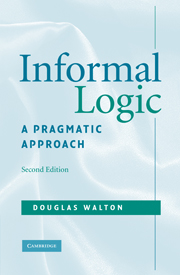Book contents
- Frontmatter
- Contents
- Preface
- Acknowledgments
- Informal Logic
- 1 Argument as reasoned dialogue
- 2 Questions and answers in dialogue
- 3 Criticisms of irrelevance
- 4 Appeals to emotion
- 5 Valid arguments
- 6 Personal attack in argumentation
- 7 Appeals to authority
- 8 Inductive errors, bias, and fallacies
- 9 Natural language argumentation
- Bibliography
- Index
4 - Appeals to emotion
Published online by Cambridge University Press: 05 June 2012
- Frontmatter
- Contents
- Preface
- Acknowledgments
- Informal Logic
- 1 Argument as reasoned dialogue
- 2 Questions and answers in dialogue
- 3 Criticisms of irrelevance
- 4 Appeals to emotion
- 5 Valid arguments
- 6 Personal attack in argumentation
- 7 Appeals to authority
- 8 Inductive errors, bias, and fallacies
- 9 Natural language argumentation
- Bibliography
- Index
Summary
Argumentation that takes place in the conversational marketplace of everyday persuasive appeals is heavily interlaced with emotional overtones and suggestions. Successful advertising, for example, seems for the most part to consist of well-orchestrated appeals to emotions, and it is quite plausible to suggest that many political debates and controversies are decided as much on the basis of emotional appeals and loyalties as on purely dispassionate reasoning.
Personal attack is often so successful as an argument tactic because of its hot appeal to personal emotions, as chapter 6 will indicate. However, here we turn to several other types of argument that have traditionally been regarded as problematic or fallacious because they use the pull of certain basic emotions. We will mainly be concerned with the emotions of pity, fear, and group solidarity.
Popular rhetoric is argument designed to persuade a specific target audience or readership. The objective is to build a personal bond with this audience, to establish a personal link between the arguer and the recipient of his message. The successful building of this emotional relationship invites the person to whom the argument is directed to trust the person who addresses him, to give him loyalty and to suspend the queries and criticisms characteristic of argument and reasonable dialogue. Personal rhetoric is therefore more directed to the instincts than to calculative reason. The emotional appeal is directed to the person's unthinking reactions, and so attempts to bypass the critical questioning and logical assessment normally characteristic of reasonable dialogue.
- Type
- Chapter
- Information
- Informal LogicA Pragmatic Approach, pp. 106 - 135Publisher: Cambridge University PressPrint publication year: 2008



